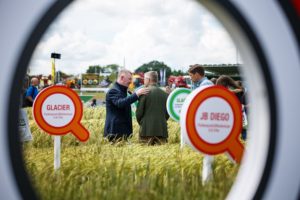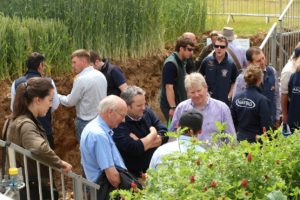 Research and practical innovation will be the key to profitable farming post-Brexit, and the Cereals event had plenty of both on offer.
Research and practical innovation will be the key to profitable farming post-Brexit, and the Cereals event had plenty of both on offer.
Celebrating the 40th anniversary of the event, director Jon Day said it was fantastic to see the 20,000 visitors making the most of so many new features introduced this year. “Bringing the industry together to exchange ideas and see new technology in action is always important, but even more so in these politically uncertain times,” he explained.
“Like the farming industry, Cereals is changing, and we’re really excited to be working together with Comexposium, which runs the SIMA event in Paris, to make next year’s event even more valuable to visitors and exhibitors alike. We’ve received strong feedback on this year’s event and will be working closely with key players – from farmers to multi-national companies – who have expressed such a strong desire to help the show develop and move forward,” he added. “Together, with greater industry involvement and extensive collaboration, Cereals 2018 will be the must-attend event that the UK market needs.”
In the opening forum debate sponsored by De Lacy Executive, industry leaders considered what the future holds for British agriculture as 2020 approaches. “We need to invest in the industry to make it innovative and profitable in the next five years,” said NFU president Meurig Raymond.
UK farming policy should be targeted at helping farmers to improve efficiencies in the transition period between now and 2020 – but the level of support required after that would depend on the success of trade negotiations, added Mr Raymond. “The trade deal is the most important issue – if we end up with a fair trade deal we can be very optimistic.”
Defra minister George Eustice visited the event, and reaffirmed the Government’s commitment to keep the total agricultural budget the same for the next Parliament. Transitioning to a better policy would include greater focus on managing risk, knowledge transfer, research and development, and supporting investment on farms to improve productivity, he said.
“I’ve seen some very interesting work today – the cereals sector is very innovative, and events like this have a crucial function to showcase some of the new varieties and techniques to farmers.” By bringing the whole industry, including research bodies together, there was huge opportunity to increase profits in a sustainable, environmentally friendly way, he added.
 Helping dispense technological advances at the farm gate was Rothamsted Research’s new science strategy, which is not just about research and development, but the way it is delivered on the ground. “We need to look ahead at what agriculture needs in the next 10 years,” said director Achim Dobermann. “There is an opportunity to become policy innovators in this country, if the government is prepared to take advantage of the scientific expertise we have.”
Helping dispense technological advances at the farm gate was Rothamsted Research’s new science strategy, which is not just about research and development, but the way it is delivered on the ground. “We need to look ahead at what agriculture needs in the next 10 years,” said director Achim Dobermann. “There is an opportunity to become policy innovators in this country, if the government is prepared to take advantage of the scientific expertise we have.”
Research institutes needed to work more closely with key partners and have more co-ordinated investment, added Prof Dobermann. “If we don’t do all of this we won’t catch up with the efficiency gains we need.”
Efficiency was also order of the day in the Sprays and Sprayers arena, which saw 50 of the latest self-propelled, mounted, trailed and specialist sprayers put through their paces. With lighter kit, precision nozzles, larger capacity tanks and improved fuel efficiency, farmers had plenty of options to consider.
Syngenta, which sponsored the arena, also announced the winner of the Farm Sprayer Operator of the year at the event. Claiming top honours from over 100 entries was BASIS qualified Stuart Woods from GH Dean & Co, Sittingbourne, Kent. “Stuart has proved a worthy winner by demonstrating that best practice can deliver efficient, cost effective and, above all, safe crop spraying,” said Syngenta application specialist James Thomas. “He has consistently shown outstanding skills and works to very high standards to achieve the best possible results.”
Cutting edge technology rubbed shoulders with good old-fashioned husbandry at the event, with visitors just as keen to get below ground and discuss soil health in the Soil Pit – sponsored by NIAB TAG – as they were to explore precision equipment in the Drone Zone. New cereal variety plots grew alongside colourful niche crops and wildflower mixes, with working machinery demonstrations ranging from Brock’s enormous 24m roller to the precise Anatis robotic weeder.


